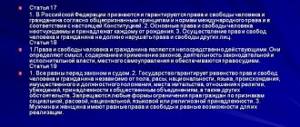Reasons for recognizing a citizen as missing
It is necessary to recognize a citizen as missing in various situations.
An interested person may apply to court to establish this fact in order to:
- receiving a pension or benefit from the state;
- deregistration of a citizen;
- registration of a relative at the residence address, if the consent of the missing owner is required;
- privatization of property when used under a social rental agreement;
- distribution of housing to citizens who are on the housing register;
- establishing orphan status;
- adoption of a child.
If a citizen is recognized as missing, the heirs do not have the right to receive his property and dispose of it. This norm is reflected in Article 1113 of the Civil Code of the Russian Federation. The right to open an inheritance appears only when a person is declared dead through the court.
Reasons
In accordance with Article 42 of the Civil Code of the Russian Federation, the main sign of the disappearance of a citizen is his absence from his place of residence for a year.
If it is impossible to set a reference date, you need to focus on the first day of the next month. Courts take into account various factors in the disappearance of a person when considering a case.
They check the presence or absence of:
- information about the deliberate concealment of a person from creditors and investigative authorities;
- intentions to go to work in another country, region, or change place of residence;
- a serious illness that could cause memory loss or death;
- important documents that were left at the place of residence;
- family conflicts that provoked the citizen’s relocation;
- statements about searching for a missing person;
- procedures for rapid re-registration of property rights.
Under what conditions can a citizen be declared dead?
Under what conditions is a citizen assigned the status of “unknown missing”?
According to the Civil Code, a citizen of the Russian Federation is considered dead if:
- there is no information about his whereabouts for five years;
- if a citizen is declared missing and has not been contacted for six months;
- if a citizen is a military serviceman and participates in hostilities, then he can be declared dead by the court if at least two years have passed since the end of hostilities.
The date of death of the citizen will be the day on which the court decision comes into force. If there are reasons why the date of death of a citizen can presumably be established, then the court may well satisfy the demands of the relatives. This could be the date the citizen went missing.
If a citizen was a passenger of a ship or transport that crashed (plane or ship), then the day his death was announced will be the day of the crash of this object. For a court to declare a citizen dead, it takes six months from the date of the crash, since the conditions of his disappearance are justified. The court recognizes the death of a citizen based on the presumption of death in an accident.
Proper plaintiff
Any person interested in the procedure for recognizing a citizen as missing can act as an applicant.
Wives often go to court if a current or former spouse has disappeared, as well as children in the event of the disappearance of a father or mother. But third parties can also submit an application:
- creditors;
- local authorities;
- co-owners of property;
- co-founders.
Before going to court, you need to determine your own status. Government authorities must understand what the applicant’s goal is.
Since 2021, alimony claimants have the opportunity to apply. The legal representative has the right to file a claim if the alimony has not appeared at his place of residence for a year. In this case, the child may be assigned a survivor's pension until the father or mother shows up.
Application to court
To declare (recognize) deceased, an application to the court (not a statement of claim) is drawn up. Any interested person can take the initiative to declare a missing person dead. A statement of claim to declare a citizen dead must be filed with the court at the place of residence of the missing person or at the location of the applicant himself.
When drawing up an application, the main thing you should pay attention to is that the application must indicate the purpose that the applicant is pursuing when taking the initiative to declare the citizen dead. In addition, the application must set out the circumstances that confirm the long-term absence of the citizen, as well as facts and evidence that give reason to assume the death of the person from an accident or death at the hands of unknown persons.
Algorithm of actions
A person is recognized as missing in court.
The case is being considered as part of special proceedings. Based on Article 276 of the Code of Civil Procedure of the Russian Federation, a hearing is scheduled in the court at the applicant’s place of residence.
The procedure is carried out in several stages:
- A citizen draws up a statement of claim. Together with a package of documents, he applies to the city or district court.
- If necessary, witnesses are invited who can confirm the fact of the disappearance of a person.
- Based on Article 278 of the Code of Civil Procedure of the Russian Federation, cases of recognizing citizens as missing are considered in the presence of a prosecutor.
- Having considered the circumstances of the case, the court makes a decision. If it is positive, the document can be used by the plaintiff in various government organizations.
List of documents
The list of documents may change depending on the circumstances of the person’s disappearance and the actions of relatives aimed at searching.
The basic package includes the following papers:
- Plaintiff's civil passport.
- Identification card of the missing citizen (if available).
- Documents confirming relationship with the missing person. If a third party (creditor, authorities) applies, confirmation of the relationship between the parties is required.
- Certificates from the place of residence and work of the absent person. They will help confirm the fact of the loss.
- Documents from the police confirming that search activities were initiated by the plaintiff. In the absence of these measures, the court will refuse to establish the fact.
- Original receipt for payment of state duty.
- Additional documents. These include petitions to call witnesses and request documents.
Sample statement of claim
It is necessary to file a claim in court in accordance with the provisions of Article 131 of the Code of Civil Procedure of the Russian Federation.
It is also necessary to remember the specifics of filling out an application for consideration of a case in a special proceeding. An important point, based on Article 277 of the Code of Civil Procedure of the Russian Federation, is to display the reason for recognizing a citizen as missing. The statement of claim must include the following information:
- the name of the judicial authority that will hear the case;
- data of the applicant, interested parties;
- circumstances of the loss (date, time of loss, duration of absence, factors influencing the loss);
- the purpose of recognizing a citizen as missing;
- list of attached documents;
- date, signature of the plaintiff.
Expenses
When filing a claim in court, you will need to pay a state fee.
In accordance with Article 333.19 of the Tax Code of the Russian Federation, its amount is 300 rubles. If additional participants (lawyer, translator) are involved, a larger amount will be required. It is also worth considering the payment of travel and accommodation costs for third parties.
Deadlines
Submitting an application is possible at any time, but not earlier than 1 year after the loss.
This period is reflected in Article 42 of the Civil Code of the Russian Federation. In this case, the citizen may be declared missing. Some plaintiffs turn to the courts at a later date. If a person has been missing for more than 5 years, the law can recognize him as dead. This is evidenced by Article 45 of the Civil Code of the Russian Federation.
Based on Article 154 of the Code of Civil Procedure of the Russian Federation, consideration of the claim is carried out within no more than 2 months. But, as judicial practice shows, some cases are heard over longer periods.
Judgment
After considering the circumstances of the case, the court makes and announces a decision.
Based on Article 209 of the Code of Civil Procedure of the Russian Federation, the document comes into force 1 month after its announcement. Participants in a trial have the right to appeal. To do this, you must file an appeal. Then, in accordance with Article 335 of the Code of Civil Procedure of the Russian Federation, the decision will come into force after consideration of the complaint.
Declaring a citizen dead: grounds, procedure, consequences.
Recognizing a citizen as missing does not eliminate the legal uncertainty that has arisen, since he remains a participant in a number of legal relations. Meanwhile, in the event of a long-term absence of a citizen, if it is impossible to establish his place of residence, there is reason to assume that he has died. However, legal consequences cannot be associated with such an assumption until the facts giving rise to it are established officially, because an error in resolving this issue can lead to serious violations of the rights and interests of the individual.
According to paragraph 1 of Art. 45 of the Civil Code, a citizen may be declared dead by the court. In this case, it is not required that he was previously declared missing.
The conditions for declaring deceased are:
1) the absence of a citizen from his place of permanent residence for five years, counting from the date of receipt of the last information about him, and in certain cases specified in the law - six months;
2) failure to receive information about the citizen’s place of residence within the specified period and the impossibility, despite the measures taken, to determine whether he is alive.
The reduced six-month period for declaring a citizen dead applies, as stated in the law, if the citizen went missing under circumstances that threatened death or gave reason to assume his death from a certain accident. For example, if it is known that a citizen was a passenger or crew member of a sunken sea vessel or an airplane crash, then it takes six months to declare him dead, since the assumption of his death under such conditions is very reasonable. However, in this case the court does not recognize the fact of the citizen’s death, but declares him dead on the basis of the presumption of death during an accident. The law specifically defines the conditions for declaring dead a citizen who disappeared during hostilities: he can be declared dead by a court no earlier than two years after the end of hostilities (clause 2 of Article 45 of the Civil Code).
PTM training course! Large selection of specializations. Professional teachers. Sign up!mostrudexpert.ru Yandex.Direct
Based on a court decision to declare a citizen dead, the registry office issues a death certificate to interested parties . The day of death of a citizen declared dead by a court decision is the day this decision enters into legal force. If a citizen who has gone missing under circumstances threatening death or giving reason to assume his death from a certain accident is declared dead, the court may recognize the day of the citizen’s death as the day of his alleged death (for example, the day of the death of a passenger plane, the day of an earthquake or other natural disaster and etc.).
The legal consequence of declaring a citizen dead is the termination or transfer to the heirs of all rights and obligations that belonged to him as a subject of law, i.e. in fact, these are the same consequences that the death of a person entails.
In the event of the appearance of a citizen declared dead, it is not necessary to restore his legal capacity. While alive, he remains fully competent, despite the court's decision to declare him dead. All legal actions performed by him at a time when he, without knowing it, was mistakenly declared dead somewhere (concluded agreements, issued powers of attorney, etc.) are considered fully valid and have full force. Declaring him dead does not affect his subjective rights acquired in the place where he was not known to be declared dead.
Consequently, regardless of the court decision declaring a citizen dead, he is capable of being a bearer of rights and obligations. Declaring a citizen dead creates a presumption of his death. But any presumption, even a very reliable one, can be rebutted. The law allows for this possibility and establishes that in the event of the appearance or discovery of the place of residence of a citizen declared dead, the corresponding decision is canceled by the court (clause 1 of Article 46 of the Civil Code).
The court decision is the basis for canceling the death record in the civil registration book (Article 257 of the Code of Civil Procedure). As noted, there is no need to restore the legal capacity of the citizen who appeared, since he did not lose it. However, there is a need to restore his subjective rights, primarily his property rights. In this case, the basis for the acquisition of his property by other persons - free of charge or on a paid basis - is of great importance. According to paragraph 2 of Art. 46 of the Civil Code, regardless of the time of his appearance, a citizen may demand from any person the return of the remaining property that was transferred free of charge to this person after the citizen was declared dead (for example, to an heir, to the person to whom the property was donated, etc.). This rule is fully consistent with the principle of justice, since citizens to whom the property was transferred free of charge, in the event of the return of this property to the owner, as a rule, do not suffer material damage.
The rule on the return of property belonging to a person who was mistakenly declared dead is closely related to the provisions of Art. 301 - 303 of the Civil Code, regulating relations regarding the recovery of property from someone else’s illegal possession (vindication). In relation to the reclaiming of his property by a citizen after the court has canceled the decision to declare him dead, if this property was acquired quite legally by his heirs and other persons, it should be recognized that after the cancellation of this decision the basis (title) of their ownership disappears, i.e. possession becomes illegal. If they refuse to return property belonging to him to a citizen who was mistakenly declared dead, he will have grounds for filing a claim to recover this property from their illegal possession, i.e. vindication claim (Article 301 of the Civil Code). If the illegal owners were conscientious because they did not know that the citizen declared dead was alive, then their property can be demanded only in the cases specified in paragraph 1 of Art. 302 of the Civil Code (in particular, in the case when the property has left the possession of the owner or the person to whom it was transferred into possession by the owner, against their will). If a citizen is declared dead, his property ends up in the possession of other persons not by his will and therefore it can be claimed from bona fide purchasers.
By satisfying the requirement to seize property from an illegal (albeit bona fide) acquirer, the court also resolves related claims. In particular, a bona fide purchaser, in the event of seizure of property from him, has the right to demand compensation for the necessary expenses incurred on him (subject to the conditions provided for in paragraph 2 of Article 303 of the Civil Code). In addition, a bona fide owner has the right to retain the improvements he has made if they can be separated without damaging the property. At the same time, he is obliged to return or compensate the owner for all income that he received or should have received from the time when he learned or should have learned about the illegality of possession or received a summons on the owner’s claim for the return of property.
A citizen who was mistakenly declared dead has the right to demand the return of the remaining property from persons who received it free of charge, provided that this property belonged to the citizen. If he was married and there was joint property acquired by the spouses, it is possible to demand the return of only the part of the common property due to him. Some types of property cannot be returned. These are money and bearer securities (clause 3 of Article 302 of the Civil Code).
When providing for the return of preserved property, the law refers to property that has been preserved in kind. The law does not provide for the recovery of the value of things that, after their gratuitous acquisition, were alienated by their owners for money or were lost. For example, if the heirs of a citizen declared dead sold a house acquired by inheritance, then this house cannot be reclaimed from the purchaser, who did not know that the person declared dead was alive, but its value cannot be recovered from the heirs.
The legal consequences of the case where the property of a person declared dead is acquired by someone on a remunerative basis are significantly different from the one considered. Persons to whom the property of such a citizen was transferred through compensated transactions are not obliged to return this property to him. This refers to transactions such as purchase and sale and barter.
However, the law provides exceptions to this rule: a paid acquirer of property that belonged to a person declared dead is obliged to return this property to him if it is proven that, when acquiring it, he knew that the citizen declared dead was alive. If it is impossible to return such property in kind, its value is reimbursed (paragraph 2, paragraph 2, article 46 of the Civil Code). Consequently, the obligation to return the property or reimburse its value arises in this case only in relation to persons who acted in bad faith or guilt at the time of acquisition of the property. The requirement for the return of property presented to such an unscrupulous owner is, in its content, a claim for the recovery of property from someone else’s illegal possession - a vindication claim (Article 301 of the Civil Code). It must be subject to the rules of Art. 303 of the Civil Code, according to which not only property in kind is subject to return, but also the income that the unscrupulous owner received or should have received during the entire period of ownership. Accordingly, an unscrupulous owner has the right to demand compensation for the necessary expenses incurred on the property.
In the event of the appearance of a citizen declared dead, only those of his rights that have passed to the heirs and other persons are subject to restoration (subject to the conditions discussed above). Rights that have ceased, i.e. were canceled due to the declaration of a citizen as dead, cannot be restored. Thus, the effect of personal obligations (obligations to perform any work, perform legal actions, create a work, etc.) is not restored. The issue of maintaining or terminating a marriage with a citizen who has been declared dead is decided in accordance with the norms of family law (Article 26 of the Family Code of the Russian Federation).
Consequences of recognizing a citizen as missing
The main consequences of recognizing a person as missing are highlighted:
- Property can be transferred to trust management. In accordance with Article 43 of the Civil Code of the Russian Federation, a trustee may be appointed by the court in relation to the property of the missing person. The agreement can be drawn up before the expiration of 1 year by decision of the guardianship authorities.
- The owner is not deprived of property rights (Article 1012 of the Civil Code of the Russian Federation). In accordance with the agreement, legally significant actions are performed only in the interests of the beneficiary.
- Divorce can be filed unilaterally. Divorce, in accordance with Article 19 of the RF IC, is carried out through the civil registry office in a simplified manner. The basis is the statement of the interested person. A month after the application, a divorce certificate is issued.
- Children are assigned a survivor's pension. If there are dependents, this action is possible only after the citizen is recognized as missing.
What then?
Let's assume that the trial is over and the citizen is declared dead. What's next? After all, we don’t have any factual confirmation yet. Now all that remains is to take a few simple steps (compared to legal proceedings). For example, obtain a death certificate of a citizen.
To do this, you will have to take documents confirming your relationship with the person. Don't forget to bring your passport and marriage/divorce certificate, if available. Afterwards you will have to write an application to the registry office for the issuance of a person’s death certificate. And, of course, you need to attach a court decision with an opinion to the entire list of papers. Don't forget to pay the state fee for issuing a death certificate. Nowadays, your application will not be accepted at all without it. Now you can simply wait for some time (about a month), and then go to the registry office at the person’s place of registration (or yours, depending on where you applied) to issue a certificate.
What else? Once you have this document, you should think about all the other points. This may include entering into an inheritance, as well as applying for survivor’s pensions. In principle, this is no longer so important for our current process. The main thing is that before you begin actions to register a pension and inheritance, make sure that the person declared dead will not appear on the doorstep “today or tomorrow.” In this case, it is better to wait for some time and not sell the property, as well as the property of the previous heir. After all, if he “resurrects”, everything will have to be returned. Yes, such cases do not always happen, but they do occur. Therefore, it won’t hurt to be on the safe side once again.
Legal consequences of appearance
As judicial practice shows, a person can return to his place of residence and be found in another place.
In this case, he has the right to:
- receiving property back into your own management;
- housing he owned;
- restoration of marriage;
- reassignment to the previous place of work (if the reasons for the disappearance are forced).
When a missing person is deregistered, his rights are also restored. He can be registered in housing again.
It is also possible to restore a broken marriage. The exception is when the spouse has already entered into an officially registered relationship with another person. This is evidenced by Article 26 of the RF IC.
Questions from our readers
The process of being declared missing raises many questions. We answer the most popular ones below.
Is it possible to recognize a child support worker as missing and what will this give?
A person may disappear due to unwillingness to pay alimony. When contacting the Ministry of Internal Affairs, this fact must be taken into account.
In accordance with Law No. 229-FZ, when a court decision is made, proceedings for the payment of alimony are opened. A search procedure is also initiated.
The bailiff must send requests to:
- bodies of the Ministry of Internal Affairs;
- banking organizations;
- traffic police;
- Pension Fund;
- Federal Tax Service;
- Rosreestr.
The claimant submits an application to the FSSP. It reflects the details of the court decision, the payer’s data, the period of non-payment, and the amount of the debt.
If, after a search, a citizen is recognized as missing, on the basis of a court decision, you can submit an application to the Pension Fund for a survivor’s pension.
The ex-husband was declared missing, is it necessary to return his property?
Property that was transferred to trust management is subject to return. If the person appears, all rights to real estate are restored in court.
The survivor's pension is non-refundable. The ex-husband was declared absent by the court, so the fact of unjust enrichment is not seen.
Underwater rocks
Various difficulties may arise during the recognition process:
- After being declared missing, the spouse has no right to property. Inheritance is possible only after 5 years after the disappearance, as well as the recognition of the citizen as dead by the court.
- The situation can be complicated by the appearance of a citizen, which makes it possible to cancel a previously made court decision.
- Some citizens are hiding from justice or creditors for a long time, which affects the recognition procedure.
- In the absence of sufficient legal knowledge, it is difficult to contact the judicial authorities and draw up a statement of claim.
When can you admit
The procedure for declaring a citizen dead is not too complicated. But it has many nuances and features. For example, you cannot start working on this process until a certain period of “loss”. Please note: it is possible to declare a person dead without first confirming that he was once missing. So when should we take action regarding our question today?
Firstly, if a person was previously declared missing, then you will have to wait 5 years. Only then do citizens (close relatives) have the right to appeal to the appropriate authorities.
Secondly, when people disappear in conditions that threaten life and health (in danger that suggests death), it is enough to wait only six months. And after that the citizen may be declared dead. True, everything here is quite confusing. After all, you will have to prove that the circumstances really pose a danger.
Thirdly, a person may disappear during hostilities. In this situation, “news” is given 2 years. Otherwise, we can legally begin our current process. As you can see, there are no particular difficulties here. At least for now. In addition, if a person has not been heard from in his place of residence for 5 years, the process of declaring him dead can begin. And now a little about the consequences of this process. There aren't very many of them.










